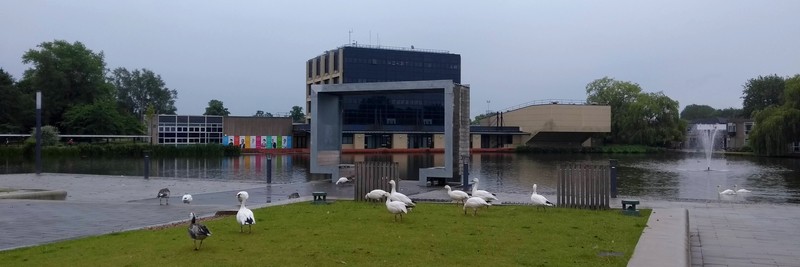Software Carpentry at York
Last month a Software Carpentry workshop organised by the Edinburgh Parallel Computing Centre (EPCC) at the The University of Edinburgh in collaboration with ARCHER and the Software Sustainability Institute was held in York. We had around twenty attendees from various backgrounds such as genetics, physical sciences, and engineering among others. My EPCC colleague Mario joined me as my fellow instructor and we also had the valuable support of three knowledgeable helpers from the Department of Physics at the University of York: Phil Hasnip, Peter Hill, and Killian Murphy.
 a lake that hosts a large family of ducks and geese adds extra life to the University of York campus.
a lake that hosts a large family of ducks and geese adds extra life to the University of York campus.
The aim of these workshops is to teach basic research computing skills to boost the attendees’ research productivity. The course covered the basics of task automation using Make, version control using Git, scripting using Python, and data management using SQL.
Comments from participants at York included:
- Good for people with little prior knowledge of Python.
- It’s great for beginners and I’ll recommend it to other researchers and postgrads in the department who are new to these topics.
- The hands on, supported introductory lessons were very useful to learn the basic logic of each of these languages. I also enjoyed that the lessons were rooted in applying content to “real” data.
- Really broad scope of topics, well paced. Enthusiastic teachers.
This was the first time I had organised a Software Carpentry workshop, although I had also attended a Carpentries instructor training course, which introduced best practices in teaching and gave me the basic skills required to organise workshops.
A Data Carpentry workshop will be run in late 2019. Keep an eye on ARCHER’s upcoming courses for further information.
Software Carpentry belongs to The Carpentries project, which also comprises the Data Carpentry and Library Carpentry communities. The Carpentries communities share a mission to teach foundational computational and data science skills to researchers. A global event called CarpentryCon is organised every two years, facilitating community-building and networking between peers.